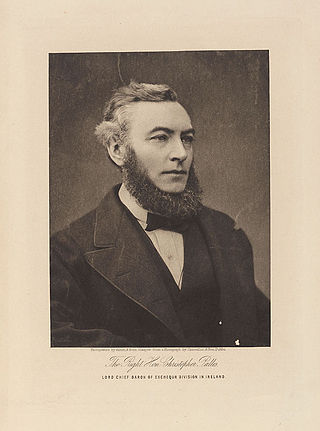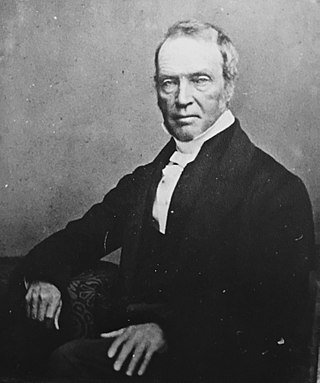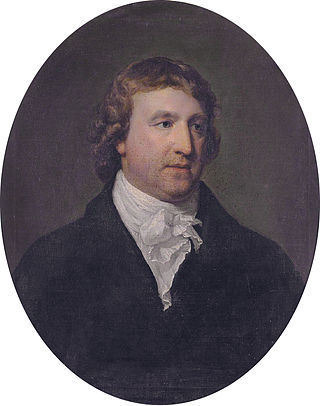Related Research Articles
Sir William Cusack-Smith, 2nd Baronet FRS was an Irish baronet, politician, and judge.

Thomas Manners-Sutton, 1st Baron Manners, was a British lawyer and politician who served as Lord Chancellor of Ireland from 1807 to 1827.

Christopher Palles was an Irish barrister, Solicitor-General, Attorney-General and a judge for over 40 years. His biographer, Vincent Thomas Hyginus Delany, described him as "the greatest of the Irish judges". He served as the last Lord Chief Baron of the Exchequer from 1874 until his retirement from the bench in 1916.
Stephen Woulfe was an Irish barrister and Whig politician. He served as Solicitor-General for Ireland in 1836 and as Attorney-General for Ireland in 1838. He was the first Roman Catholic to be appointed Chief Baron of the Irish Exchequer. He died young, due to a combination of chronic ill-health and overwork.
Sir Thomas Berry Cusack-Smith PC was an Irish politician and judge. He was nicknamed "TBC Smith" or "Alphabet Smith".
St George Daly was an Irish judge, who had a reputation for ignorance of the law. He owed his career advancement entirely to his support for the Act of Union 1801, which did nothing to enhance his standing in the legal profession.
Edward Pennefather PC, KC was an Irish barrister, Law Officer and judge of the Victorian era, who held office as Lord Chief Justice of Ireland.
Charles Kendal Bushe, was an Irish lawyer and judge. Known as "silver-tongued Bushe" because of his eloquence, he was Solicitor-General for Ireland from 1805 to 1822 and Lord Chief Justice of the King's Bench for Ireland from 1822 to 1841.
David Richard Pigot, PC, KC was one of the leading Irish judges of his time. His children included John Edward Pigot, a noted music collector and one of the founders of the National Gallery of Ireland. His grandchildren included the Australian astronomer and Jesuit Edward Pigot.
Sir Michael Smith, 1st Baronet (1740–1808) was an Irish judge. He was the founder of a judicial dynasty, several of whose members were noted for eccentricity. He was also the first of the Cusack-Smith baronets of Tuam.
John Richards PC was an Irish lawyer and judge.

Richard Wilson Greene PC, KC (1791–1861) was an Irish barrister and judge.
Henry Joy was an Irish judge. He was appointed Solicitor-General for Ireland in 1822, and Attorney-General for Ireland in 1827. He was made Chief Baron of the Irish Exchequer in 1831, a position he held until his death in 1838. He was a cousin of the United Irishmen leader, Henry Joy McCracken.

William Downes, 1st Baron Downes PC was one of the leading Irish judges of his time, who held office as Lord Chief Justice of Ireland.
Edward Willes was an English-born judge in eighteenth-century Ireland, who became Chief Baron of the Irish Exchequer.
Nicholas Nugent was an Anglo-Irish judge, who was hanged for treason by the government that appointed him. He had, before his downfall, enjoyed a highly successful career, holding office as Solicitor General for Ireland, Baron of the Irish Court of Exchequer, and Chief Justice of the Irish Common Pleas, but he was ruined by the rebellion of his nephew William Nugent, which he was accused of supporting.
Richard Pennefather (1773–1859) was an Irish lawyer and judge of the nineteenth century, who enjoyed a reputation for legal ability and integrity. He has been highly praised, in particular, for his scrupulously impartial conduct of the politically sensitive Doneraile Conspiracy Trials of 1829. He was the elder brother of Edward Pennefather, Lord Chief Justice of Ireland.
Sir Theobald (Toby) Butler (1650–1721) was a leading barrister and politician in late seventeenth-century Ireland, who held office as Solicitor General for Ireland. He is mainly remembered for framing the civil articles of the Treaty of Limerick, and for his eloquent but unsuccessful plea to the Irish House of Commons against the passing of the Popery Act of 1703, which allowed any Protestant son of a Roman Catholic landowner to prevent his Catholic brothers from inheriting the family property. He was a much loved "character" in Dublin, and his great popularity shielded him from the penalties that he might otherwise have suffered as a result of his religious beliefs. Only his few enemies attacked him for his willingness to come to an accommodation with the new regime in order to preserve his own property.
The chief justice of Munster was the senior of the two judges who assisted the Lord President of Munster in judicial matters. Despite his title of Chief Justice, full judicial authority was vested in the lord president, who had "power to hear and determine at his discretion all manner of complaints in any part of the province of Munster", and also had powers to hold commissions of oyer and terminer and gaol delivery.

Charles Burton was an English-born barrister and judge who spent most of his professional career in Ireland.
References
- ↑ F. Elrington Ball (2005). The Judges in Ireland, 1221-1921. The Lawbook Exchange, Ltd. ISBN 9781584774280 . Retrieved 30 December 2010.
- ↑ Volcansek, Mary L. Judicial Misconduct- a Cross-National Comparison University of Florida Press 1996 p.76
- ↑ O'Faolain, Sean King of the Beggars-a life of Daniel O'Connell 1938 Mercier Press Edition p.97